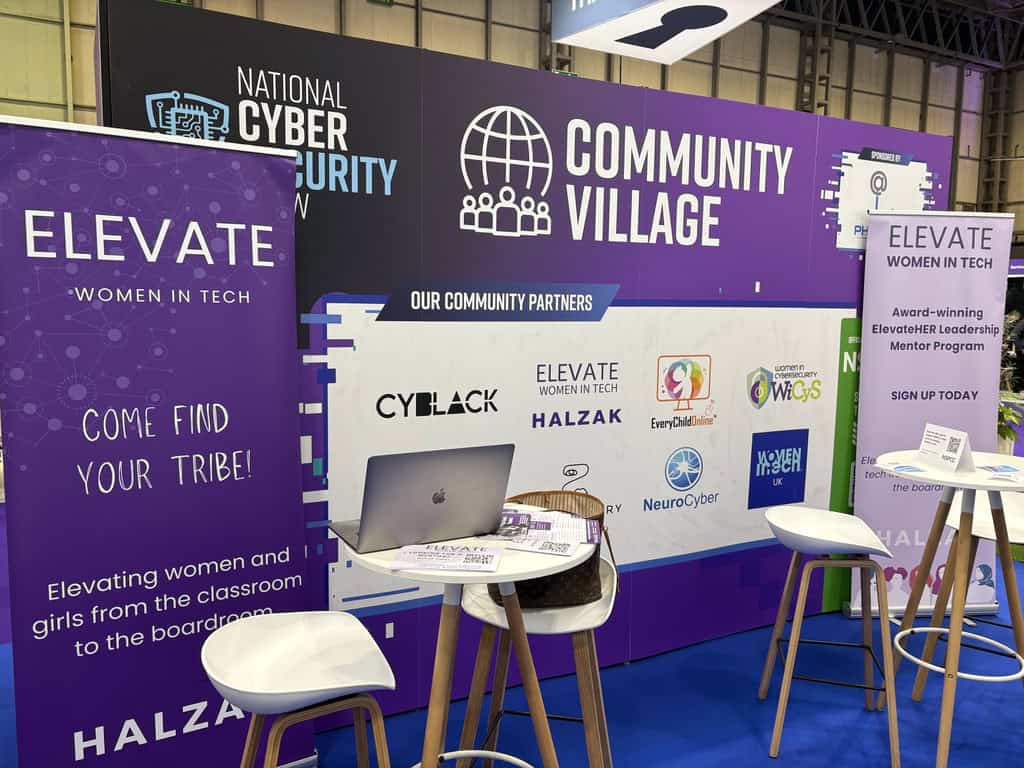
Kellie Kwarteng, Founder of Halzak and Elevate Women in Tech, joined industry leaders at the National Cyber Security Show to address the critical challenge of developing the future cybersecurity talent pipeline.

Panel Highlights: The Future Talent Pipeline – Inspiring Young People to Join the Industry
The cybersecurity industry continues to face a significant talent shortage, with diversity remaining a persistent challenge. At the recent SASIG Cyber Leaders Summit, experts gathered to discuss innovative approaches to inspire the next generation of cyber professionals.
The distinguished panel featured:
Key Challenges Addressed
The discussion centred around several critical barriers facing the industry:

Kellie Kwarteng’s Perspective: A Multi-Faceted Approach
As founder of Halzak and Elevate Women in Tech, Kellie Kwarteng shared her expertise on making cybersecurity more accessible to diverse candidates:
1. Early Engagement is Critical
“Children form career aspirations between ages 8-10,” Kellie noted. “We need to bring cybersecurity into schools through age-appropriate, fun activities like problem-solving challenges, hackathons and security clubs before stereotypes take hold.” and to ensure that parents are aware of career pathways within this space.
2. Diverse Entry Pathways
With 76% of the cybersecurity workforce being male, she emphasised the importance of highlighting alternatives to traditional degrees. “Apprenticeships, bootcamps, certification programmes and transferable skills from other careers should be opening doors for career-switchers and returners into the industry, but employers need to be more open to this approach and not the traditional ‘2 years industry experience for an entry level job’. As I’ve seen English majors and former retail managers become outstanding security professionals.”
3. Demystifying the Industry
“Breaking down industry jargon is essential for inclusion,” Kerry Harrison stressed. “We must translate technical concepts into accessible language and showcase that cybersecurity isn’t a monolithic field, but encompasses over 15 different pathways across both technical and non-technical positions.” Kellie added.
4. The Power of Mentorship
Kellie highlighted the transformative role of mentorship: “Having someone who’s walked the path guide newcomers, especially those from underrepresented groups, provides both practical knowledge and emotional support. Formal mentorship programmes are key to retention and advancement and if they don’t exist, being open to paying it forward to those within the industry to enter and of cause continue to advance”
5. Demonstrating Real-World Impact
“Reframing cybersecurity as mission-driven work that protects real people can help in the attraction of talent from diverse backgrounds” Kellie explained. “When young people see cybersecurity as meaningful problem-solving aligned with their values, they’re more likely to consider it, regardless of background.”
Kellie also shared some effective strategies for attracting and retaining diverse talent:
“Through Halzak and Elevate Women in Tech, we’ve seen firsthand how these strategies transform organisations,” Kellie concluded. “The business case is clear: diverse teams identify 80% more security vulnerabilities and solve problems up to 60% faster.”
Looking Forward
The panel agreed that building the future cybersecurity talent pipeline requires collaboration from everyone to move the dial – that’s industry, education, and government. By making cybersecurity more accessible, demonstrating its real-world impact, and creating inclusive pathways, the industry can address both its skills shortage and its diversity challenges.
For organisations looking to diversify their cybersecurity teams and develop strong talent pipelines, Kellie recommends reviewing your current internal processes: “Just because that process is how it currently is doesn’t mean it should remain that way, especially if you want to see change.” She highlighted that focusing on areas like transparency in career progression, true flexibility for ALL employees, dedicated learning budgets, formal mentorship programmes, stretch assignments for emerging talent, and regular career development conversations will help with attraction strategies but will also help keep and retain your workforce, which in itself will help with your future talent pipeline.
For more information about diversifying your cybersecurity team, contact Kellie Kwarteng kellie@halzak.com – Halzak or Elevate Women in Tech.









